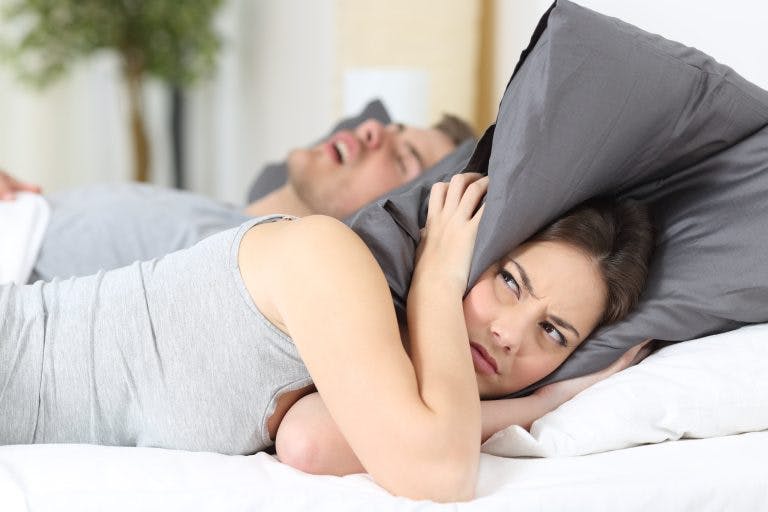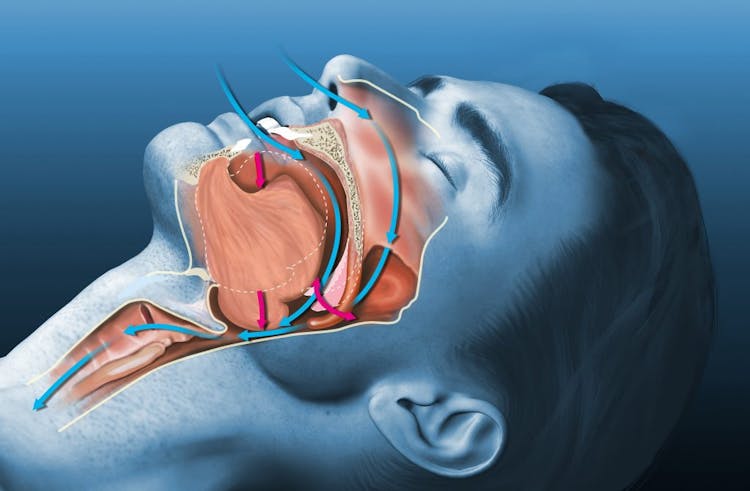What Causes Snoring And How Do You Stop It?
Published | 4 min read
Identifying what causes snoring can help provide you with the best treatment option to stop for good. These tips can help.

Since snoring cannot be self-diagnosed, patients usually find out they suffer from the condition from their very annoyed sleeping partner.
Aside from potential strains on your relationship, snoring puts you at an increased risk of many health complications. This may include high blood pressure, stroke, and depression.
Read on to learn what causes snoring and why you (or your partner) might be suffering from the condition in the first place.
What Causes Snoring?

Snoring is defined as a raspy noise produced in the nose and throat during sleep. Muscles relax during sleep, causing the tissues in the throat to loosen and the upper airway to narrow.
As a result, when we breathe in our sleep, the air will hit the soft palate (the back part of the roof of the mouth), making it flutter and generating the noise known as snoring.
Risk Factors: What Causes Snoring?
Several factors cause certain individuals to be more prone to snoring, such as:
Obesity
Obese patients have larger tonsils, tongues, and, soft palates, which can easily block the respiratory tract.
Craniofacial bony restrictio n
One study found that facial structure might play a bigger part than weight in one’s tendency to snore.
Gender
The
Additionally, their breathing during awakenings within their sleep pattern is also believed to contribute to men’s snoring.
Alcohol or other sedatives
Alcohol and sleeping pills loosen the mouth and throat muscles.
Smoking
One study found that both active and passive
Mouth-breathing
Doing this frequently can make the soft palate sag backward, covering the respiratory tract.
Age
Snoring worsens with age because older people tend to have weaker muscle tone. In menopausal women, the prevalence of snoring is thought to be an outcome of reduced female sex hormones.
Pregnancy
Pregnant women experience changes in the body that cause them to snore. Those changes include
Chronic nasal congestion
Characterized by a stuff
Obstructive Sleep Apnea (OSA)
Not all snorers have OSA, but snoring may be a symptom of OSA. Defined as a condition where breathing stops and starts during sleep, OSA can be life-threatening.
It may lead to hypoxia or a condition where your body is deprived of oxygen. This can also trigger the release of stress hormones, which in turn can induce high blood pressure-related diseases.
Tips For How To Stop Snoring

These methods are believed to be effective in stopping snoring:
- Manage a healthy weight to avoid obesity.
- Do mouth exercises to stretch and vitalize your muscles.
- Sleep sideways to prevent your respiratory tract from being pressured by your weight.
- Sleep with your head elevated.
- Avoid alcohol and sedatives before bed.
- Stop smoking.
- Treat your chronic nasal congestion.
- Use the Continuous Positive Airway Pressure (CPAP) machine that pumps air to the respiratory tract during sleep. This is a common treatment for obstructive sleep apnea.
- Traditional Chinese Medicine (TCM) recommends acupuncture. You may also try an
herbal sleep formula - Fix enlarged tonsils, nasal polyps, and other conditions through surgery.
Learning What Causes Snoring Can Help You Stop
There are various methods on how to stop snoring, and you can help your bed partner choose the one that works best for them.
If none of them help, they need to see a doctor before it worsens. Treating snoring won’t just save your relationship, it may also save your partner’s life.
This is an adaptation of an article, “Why People Snore when They Sleep,” which first appeared on the Eu Yan Sang website.
References
- National Center for Biotechnology Information. 2016. Two in a bed: The influence of couple sleeping and chronotypes on relationship and sleep. An overview
- Merck Manuals. 2020. Snoring
- Oxford Academic. 2010. Differences in Craniofacial Structures and Obesity in Caucasian and Chinese Patients with Obstructive Sleep Apnea
- National Center for Biotechnology Information. 2008. Gender Differences in Obstructive Sleep Apnea and Treatment Implications
- ATS Journals. 2004. The Influence of Active and Passive Smoking on Habitual Snoring
- National Center for Biotechnology Information. 2017. The gender difference of snore distribution and increased tendency to snore in women with menopausal syndrome: a general population study
- JAMA Network. 2001. Chronic Nasal Congestion at Night Is a Risk Factor for Snoring in a Population-Based Cohort Study
Share this article on






